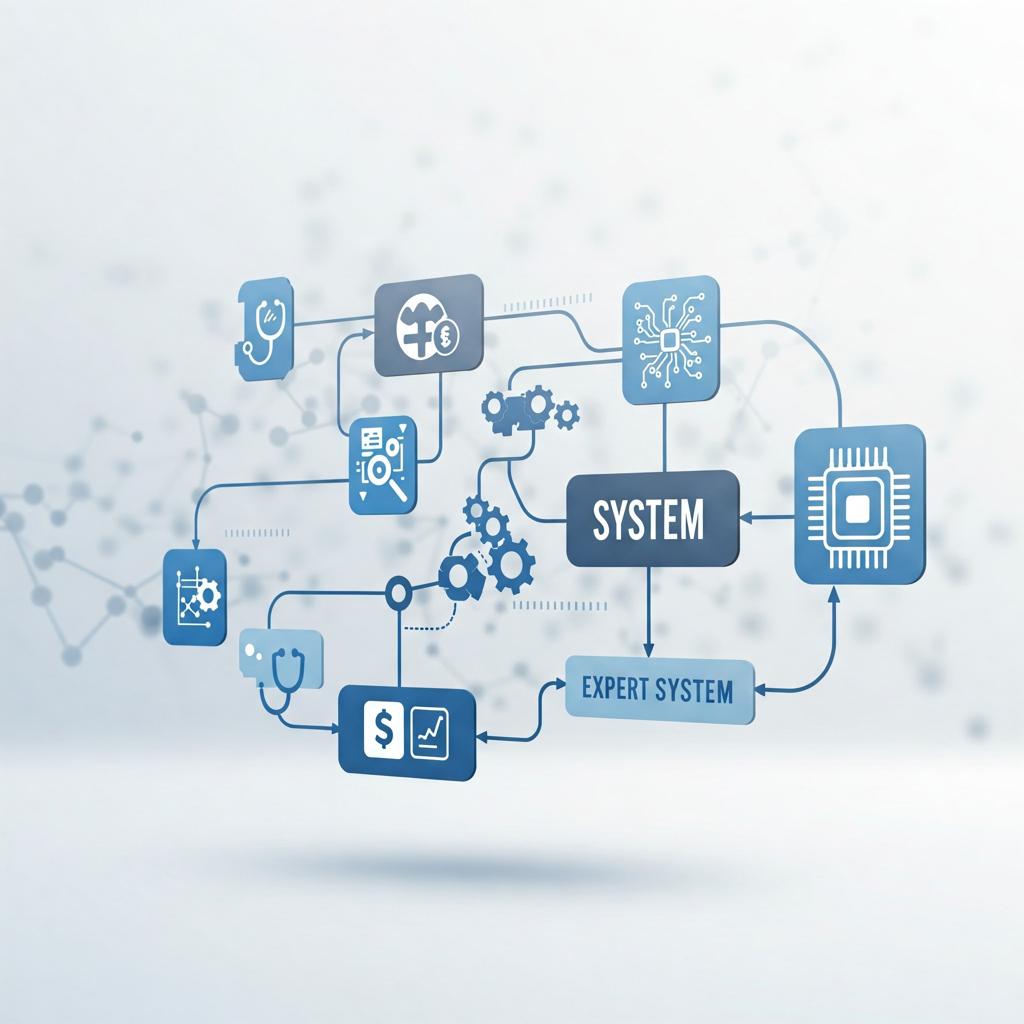
Logic-Based AI: Enhancing Explainability and Trust
Expert systems are a specialized area of artificial intelligence (AI) that mimics human expert decision-making abilities in a particular area. Expert systems utilize predefined rules and patterns of logic for solving problems or offering solutions in the area of complicated problems.
In contrast to machine learning or neural networks, expert systems are not trained to learn based on data over time but on the explicitly programmed knowledge. This places them in a very good position for well-structured, well-defined environments where decisions can be made on solid rules.
Key Principles of Expert Systems
At the center of an expert system is a set of primary components that collaborate to build the system. These components dictate how the system handles input information as well as generates decisions or solutions from knowledge.
Knowledge Base
The central component of an expert system is the knowledge base, in which all facts and decision rules applied for decision-making are stored. Knowledge base is a repository of domain knowledge in the form of "if-then" rules.
For instance, in a medical expert system, the knowledge base can contain rules that map symptoms to possible diagnoses. The completeness and precision of the knowledge base are significant factors in the system's performance since the system's performance is based on the knowledge quality.
Inference Engine
The inference engine is an expert system's reasoner. The inference engine uses rules from the knowledge base and facts entered in to make conclusions. An inference engine applies logical reasoning to determine which rules to apply and how to apply them. Two of the most fundamental kinds of reasoning mechanisms used in inference engines are forward chaining and backward chaining.
- Forward Chaining: This starts with current facts and applies rules to infer new information, or conclusions.
- Backward Chaining: This begins with a goal or hypothesis and traces backward to figure out what facts or conditions are needed to establish the goal.
User Interface
User interface makes users able to use the expert system. It can be data input, asking questions, or receiving output. User interface is typically made simple and intuitive enough that it can be applied by non-expert users of the domain. It should be simple to use so that it does not necessarily need experts to implement the system and benefit from its expertise.
Explanation System
One of the typical attributes of expert systems is also the explanation facility. The majority of expert systems possess an explanation facility that gives explanations for coming to a conclusion or making a suggestion. This is particularly vital where decisions are at high stakes, e.g., in medicine or law.
An explanation system provides transparency since it explains the reasoning to come to a conclusion, hence allowing users to believe and understand the result produced by the expert system.
How Expert Systems Work
Expert systems operate by going through a systematic set of steps that combine knowledge from the knowledge base and inference from the inference engine to reach conclusions or solutions. A general description of how an expert system typically works is as follows:
Input Data
The input information is given by the user, for example, symptoms, ailments, or other data pertinent to an issue in question. The information is manipulated by the expert system to find out the appropriate action or advice.
Rule Application
Then the inference engine of the system compares incoming facts with knowledge base rules. Depending on the rules, the system determines what holds true and applies corresponding rules to make conclusions or solutions.
Inference
According to the rules, naturally the system concludes to make a decision. It can use forward or backward chaining depending on the strategy employed by the system. Inference prevents conclusions drawn from contradicting rules and entering facts.
Conclusion or Solution
The result of rules and facts inferenced by the inference engine, the expert system generates a conclusion, recommendation, or solution. It could be a decision, diagnosis, or course of action based on information on hand.
User Feedback
There are some expert systems with feedback loops as well, where users can change their input or provide additional information to the system, and this creates a more accurate or relevant conclusion. Feedback makes the system itself more accurate and informative.
Types of Expert Systems
Expert systems are also categorized by type according to their approach, or method, of reasoning or presentation of knowledge. The three most common types include the rule-based systems, the frame-based systems, and the hybrid expert systems.
Rule-Based Expert Systems
Rule-based expert systems are the most common type and utilize a collection of "if-then" rules to make inferences and draw conclusions. Rule-based expert systems rely on human expert knowledge within the target domain. Rule-based expert systems work best in areas where concise, formalized rules may be utilized to diagnose problems, e.g., disease diagnosis or technical fault-diagnosis.
Frame-Based Expert Systems
Frame-based expert systems capture knowledge in the form of frames. Frame is a data structure that is applied to store information about a specific concept and can be employed to specify relations among objects or entities in a domain. Frame-based systems operate optimally within domains that require accurate, hierarchical representation of knowledge, such as engineering design or architectural design.
Hybrid Expert Systems
Hybrid expert systems apply more than one approach to reasoning when solving complicated problems. Rule-based reasoning can be employed by hybrid systems as well as machine learning, neural networks, or other approaches of artificial intelligence. Hybrid systems are beneficial in case one approach cannot handle the complexity of a problem. A hybrid system may apply rule-based decision-making as well as machine learning, for example, when applied in robotics to learn new environments.
Applications of Expert Systems
Expert systems have their applications in numerous fields to facilitate decision-making and solve complex problems. Major applications of expert systems are explained below:
Healthcare and Medical Diagnosis
In medicine, expert systems are used extensively to assist in the diagnosis of diseases and in planning treatment. The systems can process patient data, symptoms, and history to generate recommendations for likely diagnoses or treatments. The MYCIN expert system is a classic example of a system intended to enable physicians to diagnose bacterial infections and prescribe the correct antibiotics.
Finance and Banking
Financial expert systems undertake various miscellaneous functions like credit rating, detection of fraudulent transactions, and assessment of risk. The systems, drawing on past financial data, can predict probability of loan repayments, identify fraudulent transactions, and make recommendations for investments.
Customer Support and Troubleshooting
Expert systems are also frequently employed in customer support for product support or technical troubleshooting. Expert systems guide users to execute diagnostic procedures and present solutions based on information supplied by the user. They are extensively employed in computer support as well as in other areas of technology.
Engineering and Design
Expert systems apply in engineering to tasks such as product design, system tuning, and fault detection. The systems can analyze complex engineering information and provide proposals for design improvement, process modification, or maintenance schedules.
Legal Reasoning
In the legal field, expert systems assist in case analysis and legal research. Expert systems offer lawyers aid in managing complex legal structures, statutes, and case law and recommend or suggest approaches for specific legal matters.
Benefits of Expert Systems
Expert systems have numerous advantages that make them good tools across industries. Some of the major advantages include:
Expert-Level Knowledge
Expert systems enable a company to possess expert-level knowledge without having a human expert present for each decision. This can help in enabling companies to effectively and efficiently solve complex problems.
Consistency and Accuracy
Since expert systems operate under rules, they ensure that decisions are consistent and based on the same rationale each time. Moreover, it reduces the likelihood of error resulting from human bias or fatigue.
Availability and Efficiency
Expert systems are available 24/7, 7 days a week, and they can process high volumes of data within a limited time frame. This makes them highly effective, particularly for tasks related to quick decision-making, such as customer care or fraud detection.
Cost-Effectiveness
As expert systems eliminate decision-making needs, they can allow organizations to reduce the requirements for human intervention and therefore lower operational costs. This is particularly useful for high-volume organizations that must repeat decisions.
Challenges of Expert Systems
Aside from their advantages, expert systems also have a set of limitations that limit their usability and functionality in most industries.
Limited Knowledge Base
Expert systems are only as good as the knowledge base used to develop them. When facts and rules contained in the knowledge base are outdated or incomplete, the system may generate suboptimal or even erroneous solutions. It is not simple to modify the knowledge base.
Difficulty in Capturing Tacit Knowledge
Tacit knowledge, or knowledge that is difficult to formalize or put into words, is sometimes difficult to represent in an expert system. This might limit the scope of the system's expertise, for some subtle or advanced insights are difficult to capture in explicit rules.
Complexity and Maintenance
As the level of sophistication of expert systems increases, greater resources are required to update and maintain their knowledge base current. It is a time- and effort-consuming task to keep the system current and correct.
Lack of Adaptability
Unlike machine learning systems, expert systems cannot update themselves from the latest data or learn from the dynamic environment. This makes them less adaptable than other types of AI systems, particularly in dynamic or changing applications.
By and large, expert language systems are a very potent weapon of artificial intelligence that delivers insightful information and decision-making support in a wide range of areas. Despite the issues they have, their ability to replicate human intelligence makes them priceless for many problem-solving activities that are complex.









